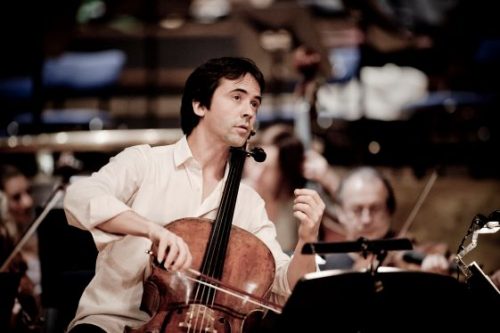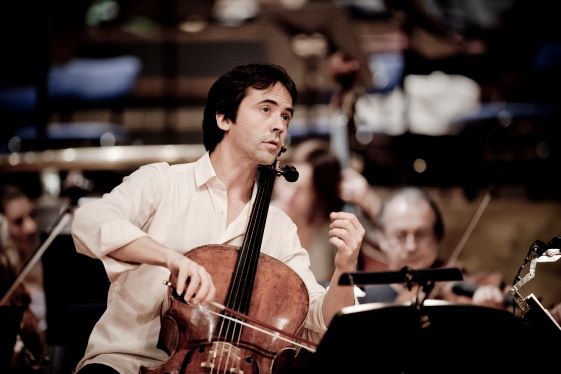 United Kingdom Haydn, C.P.E. Bach, Beethoven: Jean-Guihen Queyras (cello), Münchner Philharmoniker / Andrea Marcon (conductor/harpsichord). Philharmonie, Munich, 12.10.2019. (MC)
United Kingdom Haydn, C.P.E. Bach, Beethoven: Jean-Guihen Queyras (cello), Münchner Philharmoniker / Andrea Marcon (conductor/harpsichord). Philharmonie, Munich, 12.10.2019. (MC)

Haydn – Symphony No.39, in G minor, Hob. I:39
C.P.E. Bach – Cello Concerto No.3 in A major, Wq 172
Beethoven – Symphony No.2 in D major, Op. 36
Early music specialist Andrea Marcon with his background in period instrument performance may initially seem an incongruous collaboration with the Münchner Philharmoniker steeped in the Austro/German tradition, but far from it. Marcon conducted a programme of three classical era works, written just fifty years apart, from C.P.E. Bach, Haydn and Beethoven. Decidedly impressive is how seamlessly this modern instrument orchestra, noted for its expressive style and accuracy, can move from the Romantic tradition of Bruckner and Mahler to the classical era employing aspects of period informed performance practice. Noticeably Marcon pared down the number of players ranging from a modest 31 in the C.P.E. Bach to 45 in the Beethoven, employing brisk tempi with clean, crisp textures and using vibrato extremely sparely.
Symphony No.39, an early example of Sturm und Drang, is sometimes nicknamed Tempesta di mare (Storm at sea) and is a product of Haydn’s time as kapellmeister at the Esterházy court. Marcon and his players took the audience on a journey that was both exhilarating and dramatic. Although only taking up little space on such a large stage the 40-strong orchestra certainly produced a full sound which filled this large hall splendidly. My highlights include the glorious string sound especially marked in the stately dance rhythms of the Menuetto and the foot-tapping infectiousness of the Finale.
Known for so long primarily as J.S. Bach’s second surviving son, C.P.E. Bach is now becoming acknowledged as a significant composer in his own right. French cellist Jean-Guihen Queyras was soloist in C.P.E. Bach’s Third Cello Concerto with Marcon directing proceedings from the harpsichord. Breathing life into the music Queyras gave a captivating performance of tremendous verve that made one sit up. With impeccable intonation his Gioffredo Cappa (1696) cello fitted with steel strings produced a gorgeous, rich sound especially conspicuous in the Largo bringing out a quality of heartfelt yearning. Queyras excelled in the cadenzas demonstrating such remarkable facility and I appreciated the short but mischievous interplay between cello and double bass.
In the concert hall Beethoven’s Symphony No.2 in D major often gets overlooked by the more prestigious orchestras (unless a complete Beethoven cycle is being recorded) and on the few occasions I have attended performances it has been performed by chamber orchestras. As much as I appreciate hearing the more famous symphonies in Beethoven’s cycle, I was delighted for the opportunity of hearing the Second Symphony. I endeavour to be mindful that the symphony is a product of the time of the composer’s harrowing emotional turmoil as demonstrated by the famous ‘Heiligenstadt Testament’ he gave to his brothers in 1802. Eschewing big-band Beethoven Marcon was using 45 players including 12 wind and a percussionist and once again I was thrilled by the satisfying results of both playing and sound. Taken reasonably robustly the performance of the opening movement felt alert and determined with a magnificent internal balance. In the passionate Larghetto in Marcon’s hands the music evoked a reflection of lost love with its grey, rather solemn undertow. Striking in the Scherzo was the unusual dance-like rhythm executed with a whip-sharp precision. Uplifting and spirited throughout the Finale, taken at a very brisk pace, was noticeably underpinned by the three resonant basses. Concluding on a celebratory note the elevated level of performance deservedly obtained an enthusiastic response from the Munich audience. Normally accustomed to the Münchner Philharmoniker playing heavier Romantic works, hearing this outstanding orchestra play Classical repertoire was a real treat.
Michael Cookson
